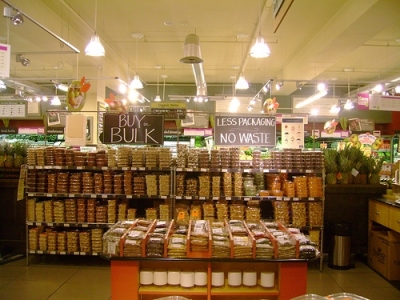We all know that the first step in helping the environment is to reduce waste. This means buying and consuming fewer products when you can, and saving energy in every possible way. However, when you do go grocery shopping, buying more can sometimes help the earth more than if you bought less. What I mean by this is not buying more for the sake of consuming more products, but buying in bulk the things that you use on a regular basis.
The biggest benefit of buying in bulk is that it leads to less waste in terms of packaging. Products that are individually packed often use up more plastic, carton, and ink than products that are crammed into one large container. This is true whether you buy detergent, milk, or toys.
Another benefit of buying in bulk has nothing to do with the environment, but is something any penny-pinching housewife will appreciate – savings. Companies usually price super-sized products a bit lower than small packets to encourage consumers to buy more. While the difference in price is not that big, those pennies will eventually add up to a significant amount.
Here are some tips for buying in bulk to ensure that nothing is wasted:
- Buy products in bulk only when you also consume them in bulk. Examples of ideal products to buy in bulk include toilet paper, shampoo, milk, biscuits, detergent, and anything that you use on a daily basis. Here’s a good list of some items you might want to buy in bulk.
- Check the expiration date. If you won’t be able to consume the product before the expiration date, then don’t buy in bulk. The last thing we want is to encourage a throw away culture.
- Do away with plastic bags and paper bags. Some products bought in bulk come with handles in their packaging (i.e. disposable diapers and toilet paper). Reduce waste further by not having them bagged.
- Do not buy non-consumables in bulk because they will just end up stocked in the house for a long time.
- Stay within your budget. As much as we want to help the environment, we also know that most families have budgets they need to work with. Exercise financial restraint when bulk buying, stocking up on the most needed items and putting off unnecessary purchases.
